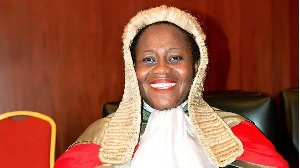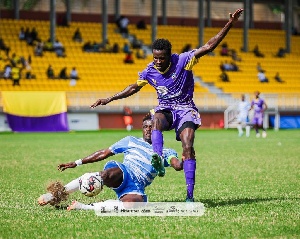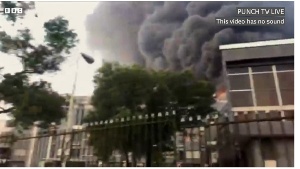- Home - News
- Elections 2024
- News Archive
- Crime & Punishment
- Politics
- Regional
- Editorial
- Health
- Ghanaians Abroad
- Tabloid
- Africa
- Religion
- Photo Archives
- Press Release
General News of Thursday, 24 April 2025
Source: www.ghanawebbers.com
'Ghana faces global rebuke over politicised judicial crackdown', says CDM
Ghana's democracy faces serious challenges after President John Mahama suspended Chief Justice Gertrude Araba Sackey Torkornoo. The Centre for Democratic Movement (CDM) calls this decision “constitutionally questionable.”
In a press statement, the CDM warns that the suspension breaches constitutional norms. It also threatens judicial independence and politicizes the judiciary.
The announcement came before the constitutionally required process was completed. This has caused outrage among Ghana’s civic and legal communities. There are fears of international condemnation as well.
The CDM states that this action undermines the integrity of the judiciary. It erodes protections meant for judicial independence.
Central to this issue is an investigative committee assessing the Chief Justice's conduct. The CDM raises concerns about its neutrality and integrity. They highlight political ties among committee members, calling it politically biased.
One member, Mr. Daniel Yaw Domelevo, has a controversial history with politics. His past clashes raise doubts about his suitability for this role.
Justice Gabriel Pwamang chairs the committee but is closely linked to President Mahama. While he has a respected career, his involvement raises questions about impartiality in such a sensitive matter.
Professor James Sefah-Dzisah's inclusion adds to perceptions of bias. He is known for opposing a new voters’ register before the 2020 elections.
The CDM warns that his presence fuels suspicions of political motives. Although Justice Asiedu, appointed by President Akufo-Addo, is on the committee, it does not balance perceived biases.
The main issue extends beyond just the Chief Justice's suspension. It involves how President Mahama bypassed established constitutional safeguards.
According to Article 146 of Ghana’s 1992 Constitution, justices can only be removed for specific reasons. A prima facie case must be established with consultation from the Council of State first.
The CDM asserts that suspending the Chief Justice before following these procedures violates Article 146 requirements. They argue that using discretion in this case breaches Article 296(c), which demands clear criteria for discretionary powers.
Citing Ransford France v. Attorney-General, they emphasize compliance with Article 296 regarding discretionary power use. The stakes involve judicial independence itself.
The CDM accuses Mahama’s administration of setting a dangerous precedent. This erodes public confidence in judicial impartiality and encourages executive overreach.
They warn it fosters mistrust in the judicial system and weakens checks and balances within governance.
This crisis extends beyond Ghana’s borders as well. The country risks breaching obligations under international frameworks like UN principles on judicial independence and African Charter articles protecting judges from arbitrary removal or suspension.
By ignoring these standards, Ghana jeopardizes its democratic reputation internationally and undermines its legal commitments as a global member state.
The CDM calls for an immediate reversal of the suspension and reconstitution of the investigative committee. They urge Parliament to investigate what they see as blatant abuse of power.
They also call on all defenders of democracy—like civil society groups and media—to unite against partisanship in defense of constitutional principles.
“This moment demands vigilance,” warns the CDM in closing remarks.
“Ghana’s democratic future should not be sacrificed for political gain.” They stress that “the Constitution must not be weaponized,” nor should “the judiciary face punishment for its independence.”











